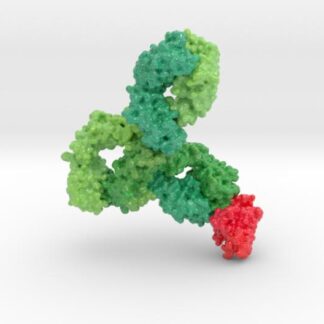Monoclonal IgG4 Antibody bound to PD1
This is a 3D print of a humanized monoclonal IgG4 antibody used in multiple types of cancer treatments. Models available in multiple materials and sizes.
This is a 3D print of a humanized monoclonal IgG4 antibody used in multiple types of cancer treatments. Models available in multiple materials and sizes.
Protein Description
Humanized monoclonal antibodies are used in cancer immunotherapy to remove a protective mechanism in cancer and allows the immune system to destroy those cancer cells. It does so by targeting the programmed cell death 1(PD-1) receptor. The drug was initially used in treating metastatic melanoma.
After scientists identified the programmed cell death 1 receptor, PD-1, as a protective mechanism on the surface of cancer cells, immunotherapies began to target this receptor to trigger its activation signal. IgG4 antibodies targeting the PD-1 pathway bind to this receptor triggering apoptosis and recruiting immune cells to clean up cancer debris.
Pubmed Abstract
“Immunoglobulin G4 antibodies exhibit unusual properties with important biological consequences. We report the structure of the human full-length IgG4 S228P anti-PD1 antibody pembrolizumab, solved to 2.3-Å resolution. Pembrolizumab is a compact molecule, consistent with the presence of a short hinge region. The Fc domain is glycosylated at the CH2 domain on both chains, but one CH2 domain is rotated 120° with respect to the conformation observed in all reported structures to date, and its glycan chain faces the solvent. We speculate that this new conformation is driven by the shorter hinge. The structure suggests a role for the S228P mutation in preventing the IgG4 arm exchange. In addition, this unusual Fc conformation suggests possible structural diversity between IgG subclasses and shows that use of isolated antibody fragments could mask potentially important interactions, owing to molecular flexibility.”
3D Print Monoclonal IgG4 Antibody bound to PD1
Questions or Requests
If you’d like to request a custom protein model or have questions about our process, please feel free to contact us below.


